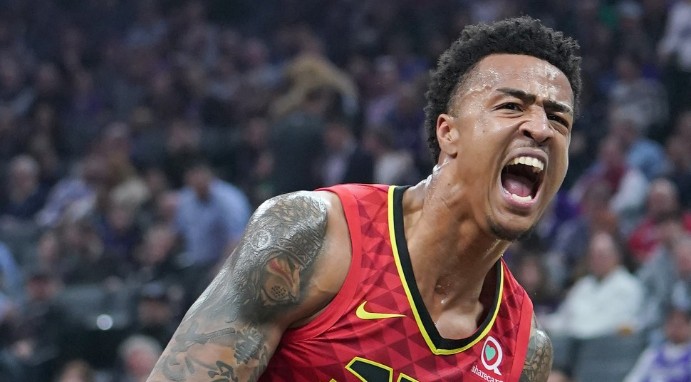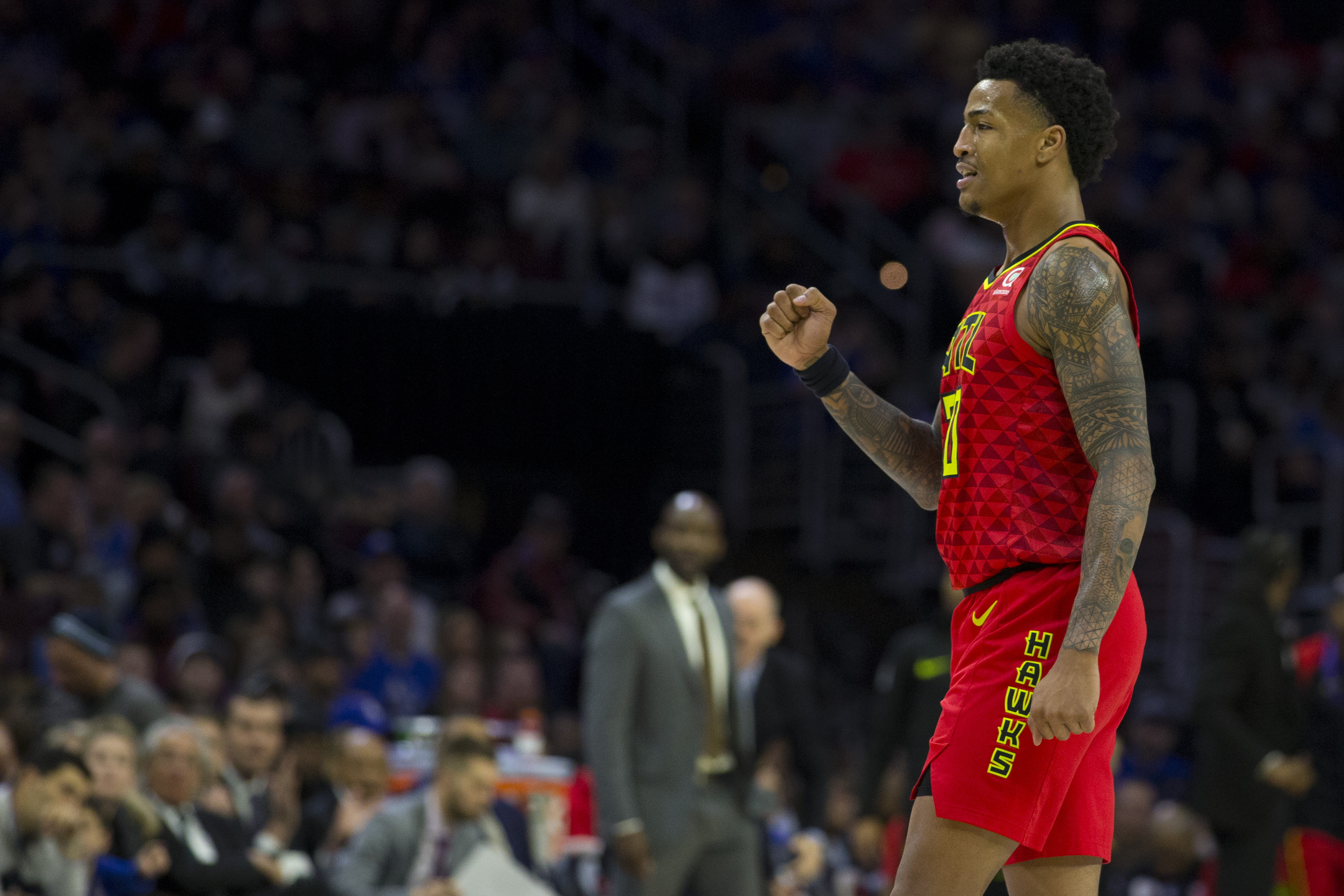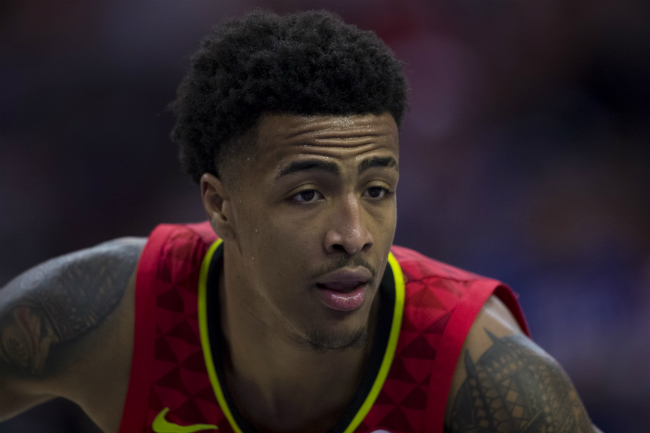
CHARLOTTE – John Collins has a remarkable ability to go from mean mug to smile in a snap. It’s not so much that the second-year Hawks player out of Wake Forest has anything to be mad about, rather there’s an intensity to him he doesn’t quite realize he’s showing off at times. When the focus lifts, the grin spreads across his face, and he settles in and allows himself to relax.
Not that All-Star Weekend is built for relaxation. It’s past 4 p.m. the night of the Rising Stars game, which Collins is scheduled to participate in, and he’s hoping for two things: food and a nap. The nap will have to wait, as he’s still responsible for some pop-a-shot in the adidas suite and another stop or two on the media blitz. But an apple arrives, at least giving him something to snack on while he enviously looks at some Chick-Fil-A teammate Trae Young has acquired.
It’s a good time to be John Collins, hunger aside. He’s putting together a heck of a most improved player campaign in Year 2, his numbers since returning from an ankle sprain that forced him to miss the first 15 games of the season have been eye-popping. The Baby Hawks continue to improve under first-year coach Lloyd Pierce. And, of course, there are those dunks, which were on full display Friday night as a preview of the Slam Dunk Contest on All-Star Saturday night.
Turner analyst and Hawks executive Grant Hill likes what he sees out of Collins, heaping praise on the forward at a lunch near Charlotte’s Mint Museum on Friday.
“He’s gotta be in the conversation for most improved,” Hill says. “20 and 10. He averaged 10 points last year. We gotta start getting that word out there. With his play, and his energy, and his leadership, and the fact that he’s still 20-21 years old. He’s still got a lot of room to grow.”
That growth isn’t stopping anytime soon, and Collins’ playfulness and intensity will be on full display at the dunk contest, where he’ll have the chance to balance that intensity with sheer joy. He sat down with Dime for a few minutes to discuss his continued evolution, learning how to be a pro, and what he has in store for the people on All-Star Saturday night.

Dime: I know one tip you were given for All-Star last year was to bring an extra suitcase. So what else did you come in with this year, knowing what to do now?
John Collins: Well, I can’t say I brought an extra suitcase, but I did pack very lightly, very lightly. I have a little extra space in the suitcase, so I’m pretty sure I’m going to be coming home with a boatload of stuff after this weekend. I always come back with a bunch of extra stuff. It’s very much appreciated though.
Year one, you’re wide eyed. You’re just saying yes to every opportunity. You’re meeting all these new people. You never know what doors are going to get open or what’s a dead-end conversation sometimes. What else have you picked up on just kind of now getting a second rep because everything in life is reps, right? Even All-Star Weekend.
Yeah, I mean I feel like for me, the biggest thing was figuring out what I actually liked and didn’t like to do. Like you said, I sort of came in sort of wide eyed and just sort of taking deals as they came. You know, as time goes on, you tend to not really like some of the deals. You take just to take. I think it just lets you learn about yourself a little bit, figure out how you want to approach this because you want to do this. This is part of your life.
You want to say yes.
Exactly. Yeah, you want to say yes to all this, but sometimes you don’t like it or you might not like whatever. I think it’s cool to figure it out.
You know how to play and everything. And your game, sometimes, it’s kind of autopilot. You know how to rebound. You know you’re going to put shots back up. The rest of the stuff, it’ll come to you.
Right.
But one thing with leadership that Kenny Smith had told us he learned over time that’s hard is learning how to say no. I don’t think I’d ever heard it put that way, right? You have to self filter things, what I’m going to learn, what I’m going to work on, how hard I’m going to work on it. Like even in football, guys can over train. You can work too hard and injure yourself trying to do the thing you want to do most. I’m curious in filtering yourself and learning through this process, what have you figured out? What are the types of things now that you know this is who I am, this is who I am not?
I figured out, well I think the biggest thing for me at least is I’ll say for a basketball perspective, I figured out how to put myself through a routine or figure out how to build a plan for my day for myself. I think last year it was sort of tougher. I was just like, ah, I’m going to try to do this, try to do this, try to do this. Now it’s like all right, game’s at whatever time? I’m going to do this, this, this, and this. Relax, take it easy. For me, like you said sometimes you know with basketball wise I can start going on autopilot, but I know once I get onto the court, for me it becomes a lot easier.
So for me, it’s all about the pre-process and making sure I’m ready to do mentally once the game starts because I know I have it there. I just gotta, you know, tap into that mental ability to use it. You know what I mean?
It’s never good to get injured, but it a lot of guys always say afterward when they get healthy that they are able to kind of see the game a little bit different. On another level, it allows you to connect with Lloyd [Pierce] a lot more, I think, which is so important with that first-year head coach. Then as you’re getting closer and closer to coming back, he’s getting more and more excited to have you, and then you can hit the ground running with it.
Yeah, I think it’s a mixture of both of those things where it’s LP and I definitely had a chance to grow, but I also think me just being injured and me having to come back from an injury changes the way I played in a little way and in terms of I wasn’t as explosive or as whatever as I was before the injury. Now, I have to play a different way. I can’t play the same way. I think that’s what helped me out is having to play a different way instead of just you need to work on this.
Now I have to do something, and it changes the whole way you approach everything.
Survival now.
Right, yeah.
I won’t survive if I can’t do this.
Exactly. I think that helped me out more than anything is figuring out a new way to play, and like now, once I got all the juice back, it changes, changes.
Yeah. You’ve evolved.
Continuing to evolve.
With that evolution, this Hawks team right now is not what that Hawks team is going to be three years from now.
No way.
You guys are on a mission. It’s very clearly delineated like what you guys are trying to accomplish. That being said, two parts of that are doing it but having ownership, everyone around you being patient enough to get there. How much is that kind of instilled in you guys from people like Grant [Hill] and Travis [Schlenk] and everyone else that you guys work with? And then the rest of it is just adopting that mindset and knowing all right, on a micro level, we’re going to win this game and do this. On a macro level, we have a mission to accomplish that isn’t just win a championship. It’s very much, we need to do this as we go along.
Yeah, and I think you can see just off the way we play. Just how we approach the game different from other teams I feel like who are sort of in similar situations is what your sort of alluding to. And I feel like our situation is we’re light years ahead of where we’re supposed to be and where people think we are regardless of our record. I feel like when you watch us play and you see how we play offensively, defensively, the way we move a ball, the way we run the floor. It paints a pretty bright future.
I can’t wait to be a part of it. You know, the organization and the guys are definitely letting me know that they want me to be there, want me to be a part of it. You know, me, Trae, Kevin [Huerter]. We’re going to be part of the future of the young core and have some older guys whoever’s around.
Yeah, to be there to help.
To be there to help us, yeah. To grow and to develop. That’s going to be really important.
You had an opportunity at Wake Forest to be the guy obviously under Danny [Manning], but coming into Atlanta and then after the rookie season you had and then jumping into post injury, what you’ve been doing, are you even a little bit surprised at kind of how Atlanta has adopted you as a budding star? Is that something that has resonated a little bit? Like, can you allow yourself to kind of let that sink in?
It’s almost like I feel like I had chains on my wrists and on my ankles sort of because the first year, the rookie year, I get it. I get it. I take the year to develop. Then the second year, when I got injured, I felt like handcuffed because I was like man, I’ve been working this whole summer to show all you guys I got all this. I got this.
For me it’s like the basketball, the numbers or whatever, I know I can do this. The thing that surprised me was the consistency I did it with. I think that surprised me a little bit, but I knew I could put up 20 and 10, 20 and 10. Like I knew that, no issue, but the consistency for me was the big part, doing it on a level game after game, the streaks I have, whatever streaks. I think they’re letting me know that okay, this isn’t a fluke. I’m really out here doing this seriously, and I can play with anybody.

Yeah and you believe it. You don’t get to the level if you don’t believe it. There’s something really nice about reinforcing it like having something you can point to and say like, ‘I knew this.’
Exactly, and that’s how I felt. It was like man, I know I can come out here and do this. I wasn’t ever worried about the basketball side. I knew it was going to take care of itself. Like I knew after my rookie year and how I played, I belonged. So I was never really worried about that. I was just more like I said, I’m really more focused on like the off-the-court stuff because I feel like for me, it’s tough sometimes just to have learned all this stuff all at once, and I think that makes it easier for me.
They give you money and more free time than you’ve ever had, and you don’t have that in college.
Yeah, people literally don’t, like, understand the difference of going from college where you wake up from 7 a.m., you have tutoring, class, practice, tutoring, class, all day. You go to sleep. Then after getting drafted, you might have practice, you might not. And the game’s at this time. It’s like, man. I got the whole world at my fingertips, all this money, all this. Now I’m famous for basketball – for something I’ve been doing my whole life. So that’s why it’s always a little, a little cool just to be like okay, now I’m doing this. I used to just do this for fun. Now, I’m doing this for a job and for a career.
A couple quick things about dunking. Do you have a dunk contest moment that was your favorite growing up that you remember that’s like that’s the one I always go back to?
There’s one I will always go back to … It’s got to be, I don’t know. See for me, it’s either Vince’s 360 or the Elbow. But the two dunks that were crazy for me when Zack (LaVine) won with the eastbay from the line, and when Aaron (Gordon) jumped over the mascot.
I know you’re a power dunker, but when you’re approaching a dunk contest, are you adding, you know, pizazz and celebration and all the story stuff?
Both. I’m going to try to power dunk the hell out of the ball and then show off. You know what I mean? Then showboat. Show it to the crowd.
A flourish.
Flourish or whatever the word is. Flex to the crowd. Like that’s the whole goal is to do everything at a A level. I want to flush it as hard as I can. Hopefully, you know, show out to the crowd a little bit and hopefully have a little story too.
I’m still not sure what order the dunks are in, but that’s going to have another factor into it too. But I have some dunks for sure.






